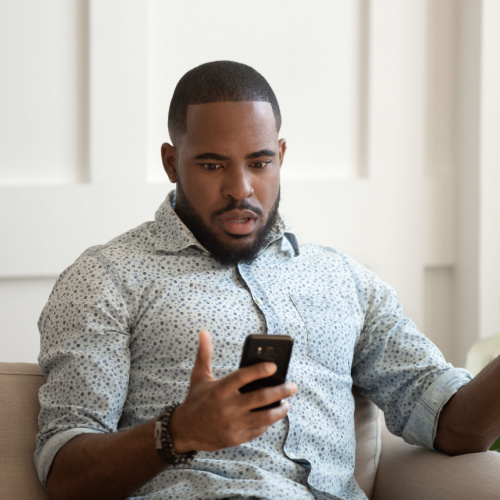Are You Phubbing? How It Can Hurt Relationships
Let’s face it – many of us spend far too much time on our smartphones these days. Unfortunately, snubbing your conversational partner for your phone, or “phubbing,” is not only rude, but it can also hurt your relationships if you allow it to go too far.
Let’s take a closer look at what phubbing is, how it impacts relationships, and how to stop phubbing so you can experience healthier relationships.
What Is Phubbing?
Put simply, phubbing, a portmanteau of phone snubbing, means ignoring someone in favor of your cell phone.
It can happen while you’re conversing with the person sitting next to you, while you are at the table speaking among a small group, or in any other social circumstance where you should be paying attention to what people are saying. This habit can have a real negative impact on the person on the receiving end of phubbing.
For example, say that you start to have a serious conversation with your friend. Your smartphone beeps because you just received a notification from an app on your ever-present mobile phone. Rather than ignoring your phone and focusing on the conversation, you pick up your device and read the notification, splitting your attention between your friend and whoever is trying to contact you.
This can cause a very real injury to the phubbed person. Unfortunately, it’s also something that we collectively do all the time, and many of us struggle with phubbing on a day-to-day basis.
In a lot of cases, it happens automatically and without any thought. Your phone beeps, so you check it out.
Note that phubbing can also come in different forms. For instance, someone might look around or over you unconsciously to find something more interesting rather than pay attention to your conversation. In any case, phubbing implies that your phone or something else is more important than the person you are talking to.
Phubbing can be a side effect of social media and phone use, both of which encourage endless scrolling. People might engage in phubbing because they seek a sense of belonging or want to boost their self-esteem, and it may also be an indication of internet addiction.
In the worst cases, phubbing can indicate low relationship satisfaction and disrespect. In addition, it can lead to other problems in everyday life if you’re phubbing a loved one or partner. However, you can overcome phubbing and return to face-to-face conversations with the right techniques and self-awareness.
How Can Phubbing Hurt Your Relationships?
Phubbing is often seen as negative and harmful to relationships because it can cause damage in no time. In fact, phubbing can hurt your relationships, whether familial, friendly, or romantic, in various ways.
It Can Cause Miscommunications
For starters, phubbing can often lead to miscommunications. After all, most serious conversations and friendly chitchat require focus and attention on your part. You need to make eye contact with the other speaker, hear and fully absorb what they say, and respond appropriately to keep the conversation going.
If you fall to phubbing, however, your attention will automatically be distracted or split between at least two topics. Don’t fall for your own ego: no one can actually multitask. So when you think you are mastering a conversation and typing away a text response, you may actually be missing something important — not to mention your text message might have a few typos.
This can lead to miscommunications in terms of tone, conversational content, and intent. For instance, you might really intend to have a heart-to-heart conversation with your best friend, but if you start phubbing, they might think that you don’t take them seriously, leading to relationship damage.
It May Reduce Bonding Hormones
In some cases, phubbing can even reduce how rapidly you bond with someone. That’s because eye contact and personal attention are crucial for releasing oxytocin and other hormones, which are important in the relationship bonding process.
Simply put, if you succumb to phubbing, you probably aren’t paying attention to your conversational partner. This can make it more difficult for you to form new friendships, connect with a romantic partner, etc.
All of that can mortally wound a new relationship before it begins. That’s why you should be on guard against phubbing — especially when in a romantic situation!
It Can Increase Stress
Phubbing may also increase your stress. You may know that being on your phone constantly isn’t good for your well-being, but constantly splitting your attention can cause stress, too.
Not only does phubbing increase the amount of sensory input your brain is receiving, but it can also decrease your ability to focus on either your conversation or your phone. This can all contribute to a low level of constant stress, which may appear in other areas of your life.
It May Insult Others
Above all else, phubbing can be seen as an insult. Whether intentional or not, phubbing can send other people the signal that they aren’t as important as whatever is on your phone.
They may feel insulted by this perceived slight. Even worse, they may start to withdraw from your friendship. You may even be able to look back and see a pattern of this happening in past relationships.
How Can You Stop Phubbing?
Luckily, you can work to stop phubbing in plenty of ways.
Put Your Phone Away and Have Rules for It
If you notice yourself phubbing more frequently, set some rules around your technology use to help you put your phone away more frequently. This can be particularly handy if you are vulnerable to phubbing during normal social occasions with your friends and family, like dinner.
For example, you can implement a new rule preventing anyone from bringing their smartphones to the dinner table. This can prevent phubbing by helping you avoid the temptation to check your phone.
Similarly, practice putting your phone away more frequently and sticking to that habit. Over time, you’ll find that you may phub less frequently and are less vulnerable to doing it in the first place.
Refocus on Eye Contact
On your part, you can also refocus on making eye contact with the people you speak to, whether they are friends, family members, or significant others. Eye contact is key to maintaining another person’s attention in conversation or social interaction.
Not only is eye contact polite, regardless of the conversation’s content, but it can also help you stay engaged, even if you don’t find it very interesting. You can use this tip when you meet someone new for the first time and are making small talk.
Practice Mindfulness
More generally, you can practice mindfulness to help cut down on phubbing in all social settings. Mindfulness is paying attention to what’s around you and what your body sees, feels, and experiences. It’s a key part of remaining aware of your surroundings and absorbing the interesting parts of life.
More to the point, practicing mindfulness can help you avoid phubbing since it can help you stay interested in the world around you — not in what’s on your phone.
Don’t Take Offense
What if someone regularly phubs you instead? In that case, there are two main things you can do to help reduce phubbing and prevent it from impacting your relationships.
For starters, remember not to take too much offense to it, particularly if it only happens occasionally. Most people who succumb to phubbing do it accidentally or without thinking about it. It’s just an instinct trained into them by the incessant mobile devices we all keep in our pockets.
By staying calm and not taking offense, you can move on to the next step and hopefully reduce phubbing for good.
Redirect the Attention of the Phubber
Next, try to redirect the attention of the person phubbing you by stating their name and trying to make eye contact. In most cases, this can help them immediately realize what they’ve done wrong.
Once you have their attention, explain how it makes you feel to be phubbed. This can help you build a stronger relationship. Then move the conversation along and extend some courtesy to your partner — after all, we all make mistakes occasionally!
The Bottom Line on Phubbing
All in all, phubbing is a growing negative phenomenon that we should all take seriously. Not only can phubbing affect your relationships, but it can also prevent you from making new ones.
By keeping the tips in mind above, you can do your part to prevent or reduce phubbing when you’re speaking to others. Check out 1AND1’s other guides and resources for more wellness tips today!
Sources:
What Is Phubbing? Why It’s Bad for Relationships and Mental Health | Time
A descriptive literature review of phubbing behaviors – PMC | NCBI








